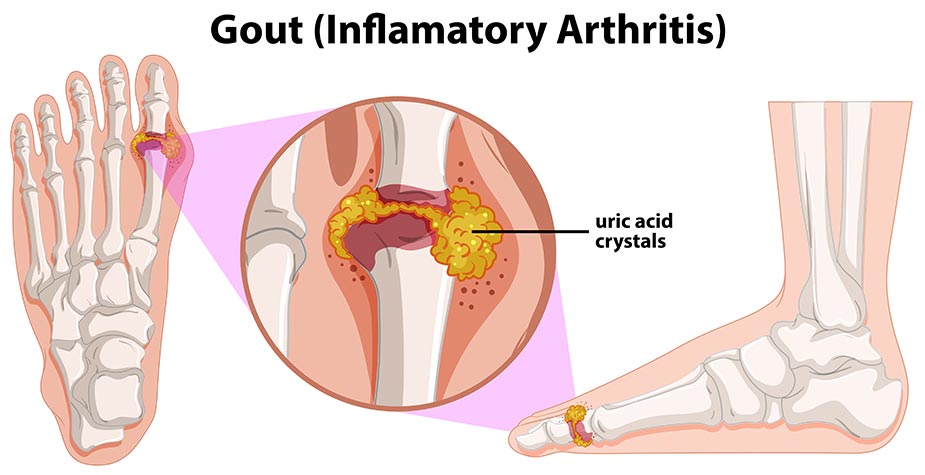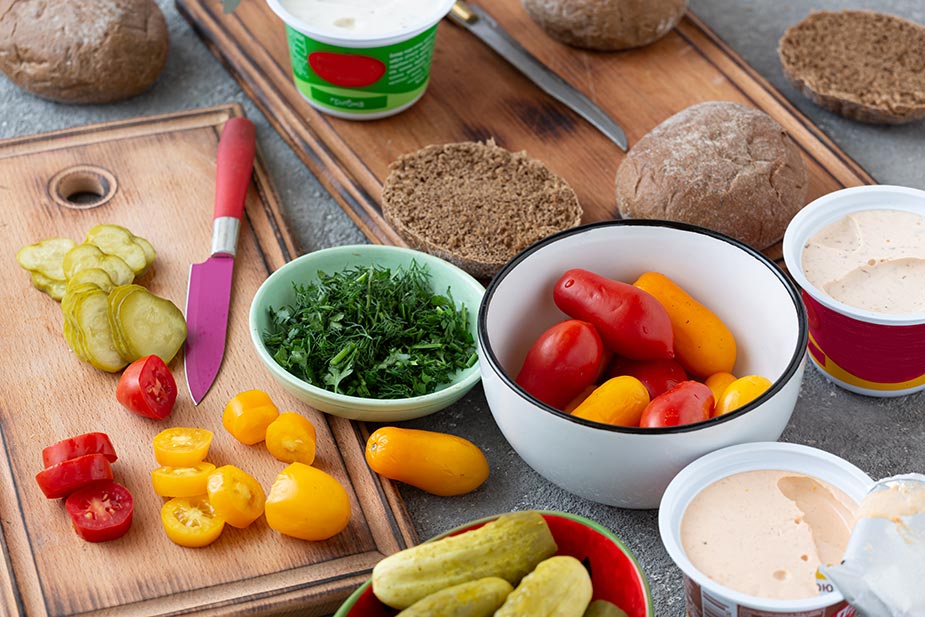You’ve probably heard of the gout diet. If you’re fortunate enough not to be affected by this condition, the following information will still be useful for you or your loved ones in case you ever encounter gout.
1. What is gout?
Gout is a type of arthritis that occurs due to the accumulation of uric acid crystals around joints and surrounding tissues. It most commonly affects the big toe joint and is accompanied by severe pain, joint redness, and swelling. Gout can also occur in the knees, elbows, and hips. Acute gout typically resolves within two weeks, even without treatment.
Recurring inflammation may lead to chronic disease, characterized by severe pain and reduced joint mobility. Therefore, it’s essential to seek timely medical assistance for gout treatment.

2. Risk factors for developing gout
The main risk factors for developing gout include:
- Obesity
- Smoking
- Excessive alcohol consumption
- Physical inactivity
- Genetic predisposition
- High intake of purine-rich foods (Purines are chemical compounds found in many foods, such as meat, seafood, and alcoholic beverages, especially beer.)
3. The gout diet
You may wonder how a gout diet can help and, generally, how healthy eating can benefit the treatment of this disease. While healthy eating won’t cure gout, it can help control the condition by reducing symptoms and the frequency of attacks.
Interesting fact: Gout was once considered a disease of kings and nobility because it mostly affected the wealthy. The reason is clear: overeating and excessive alcohol consumption.
Foods to avoid
Research has shown that certain foods can increase uric acid levels in the body and contribute to gout flare-ups. To better manage your gout symptoms, it’s essential to be mindful of your dietary choices. Here’s a list of foods to avoid:
- All types of meat
- Organ meats
- Mackerel, sardines, mussels
- Yeast
- Processed meats and pâtés
- Mushrooms
- Sweets
- Carbonated beverages
Gout-friendly foods
Incorporating gout-friendly foods into your diet can help reduce inflammation, lower uric acid levels, and improve overall health. Here’s a list of foods that are beneficial for individuals with gout:
- White meat
- Low-fat dairy products
- Oats, cornmeal, whole-grain crackers, rice
- Fresh vegetables
- Fat-free soups and broths
- Legumes
- Fresh fruits
- Tea and coffee (Research from 2018 has shown that coffee consumption does not negatively impact gout.)
- Nuts
- Fresh vegetable and fruit juices
- Olive oil
Superfoods for gout
Superfoods not only won’t harm or worsen your gout symptoms, but their consumption can also lead to improvements that reduce the severity of the disease. Some superfoods have anti-inflammatory properties, while others have diuretic effects – in any case, it’s crucial to include them in your daily diet.
- Celery aids detoxification and weight loss, making it excellent for a gout diet. It’s considered one of the best foods for managing gout.
- Garlic is effective against gout due to its antioxidant content and anti-inflammatory effects. It also helps regulate uric acid levels in the blood.
- Onions are a natural remedy for gout. They positively affect metabolism, reduce bad cholesterol, and have a diuretic effect, promoting overall detoxification.
- Turmeric is well-known for its anti-inflammatory properties, helping reduce joint inflammation and pain. Consume it orally as “golden milk” or in the form of honey-based poultices. Ginger has demonstrated similar effects on gout.
- Whey is essential for cleansing the body and is highly beneficial for gout. Rich in calcium and magnesium, it’s great for joints, making it a popular superfood among athletes. Plus, it’s low in calories, promoting weight loss.
- Pineapple contains bromelain, an anti-inflammatory compound that’s very beneficial for gout. It’s recommended to consume pineapple daily.
- Baking soda: Taking one teaspoon of baking soda dissolved in 6.8 fl oz (200 ml) of water daily can have positive effects on gout.
- Lemon: The vitamin C and potassium in lemons can help with gout. Drink the juice of half a lemon in half a glass of water before breakfast.
- Apple cider vinegar reduces body acidity, boosts immunity, and promotes weight loss, all of which are helpful for gout. Use it in salads or take one tablespoon daily in a glass of water, preferably before breakfast.
Weight loss is a crucial part of combating gout. Losing weight helps reduce uric acid levels in the body and alleviates the burden on affected joints.
A celery recipe for the gout diet
Grate 14 oz (400 grams) of celery root. Boil for 20 minutes in 2 liters of water with the zest of one lemon. Remove from heat and let it sit for 6 hours. Add the juice of 2.2 lbs (1 kg) of lemons, then strain through cheesecloth. Store in the refrigerator and consume 3.4 fl oz (100 ml) of the drink before each meal.
Four tips to help manage gout
- Drink at least eight glasses of water daily.
- Engage in moderate physical activity.
- Lose weight.
- Avoid alcohol consumption.
By following the recommendations above, you can reduce the frequency of gout attacks and significantly improve your quality of life.
4. 3-Day Gout-Friendly Meal Plan: Fight Gout Naturally with These Nutritious Meals
Day 1:
Breakfast:
- Oatmeal with almond milk, topped with fresh berries and a handful of almonds
- Green smoothie (spinach, cucumber, apple, and lemon)
Lunch:
- Grilled chicken salad with mixed greens, cherry tomatoes, cucumber, and a lemon-olive oil dressing
- Whole-grain crackers
Dinner:
- Baked salmon with steamed vegetables (broccoli, carrots, and green beans)
- Brown rice
Snack:
- Low-fat yogurt with a small handful of walnuts
Day 2:
Breakfast:
- Scrambled eggs with spinach and low-fat cheese
- Whole-grain toast
- Fresh fruit salad
Lunch:
- Lentil soup with a side of mixed green salad
- Whole-grain roll
Dinner:
- Vegetable stir-fry with tofu, bell peppers, zucchini, and snap peas
- Quinoa
Snack:
- Fresh fruit smoothie (pineapple, banana, and orange)
Day 3:
Breakfast:
- Greek yogurt with honey, chia seeds, and mixed berries
- Whole-grain granola
Lunch:
- Turkey and avocado wrap on a whole-grain tortilla
- Carrot and celery sticks with hummus
Dinner:
- Grilled shrimp with a mixed vegetable medley (bell peppers, onion, and tomatoes)
- Baked sweet potato
Snack:
- A small handful of mixed nuts (almonds, walnuts, and cashews)
This three-day meal plan for the gout diet includes gout-friendly foods and aims to reduce the consumption of high-purine foods, helping to manage symptoms and reduce the frequency of gout attacks. Remember to drink plenty of water and consult your doctor before starting any new diet plan.
5. Gout Diet – FAQ
What foods help clear up gout?
Foods that help clear up gout include fresh fruits and vegetables, whole grains, lean protein sources such as poultry and fish, low-fat dairy products, nuts, seeds, and legumes. Drinking plenty of water and consuming foods with anti-inflammatory properties, like cherries, pineapples, and turmeric, can also help alleviate gout symptoms.
What are the best foods to beat gout?
The best foods to beat gout are those low in purines and rich in anti-inflammatory compounds. These include:
- Cherries and other berries
- Pineapple
- Celery
- Turmeric and ginger
- Lemon
- Similar to the Pritikin diet, gout-friendly foods include low-fat dairy products.
- Whole grains, such as brown rice and whole wheat pasta
- Nuts, seeds, and legumes
- Lean proteins, like poultry and fish
What is the fastest way to get rid of gout?
To get rid of gout quickly, it’s essential to make dietary and lifestyle changes, such as:
- Drinking plenty of water to help flush out uric acid from the body
- Avoiding high-purine foods, like red meat, organ meats, and certain seafood
- Reducing alcohol consumption, especially beer
- Eating a balanced diet rich in anti-inflammatory foods
- Taking over-the-counter or prescribed anti-inflammatory medications, as advised by a healthcare professional
- Engaging in regular, moderate physical activity
- Maintaining a healthy weight
Are eggs good for gout?
Eggs are generally considered a good choice for people with gout, as they are low in purines. However, they should be consumed in moderation, as part of a balanced diet that includes a variety of other healthy foods.
Conclusion
In conclusion, the gout diet is an essential component in managing gout symptoms and preventing flare-ups. By focusing on a balanced, low-purine diet rich in anti-inflammatory foods, along with maintaining a healthy lifestyle, individuals with gout can significantly improve their quality of life.
It’s crucial to remember that while the gout diet can help control symptoms, it’s not a cure for the condition. It’s always best to consult with a healthcare professional for personalized advice and treatment plans. By following the recommended dietary and lifestyle changes, people with gout can experience fewer attacks, better overall health, and enhanced well-being.
. . .
“Health is not valued till sickness comes.” – Thomas Fuller
. . .




